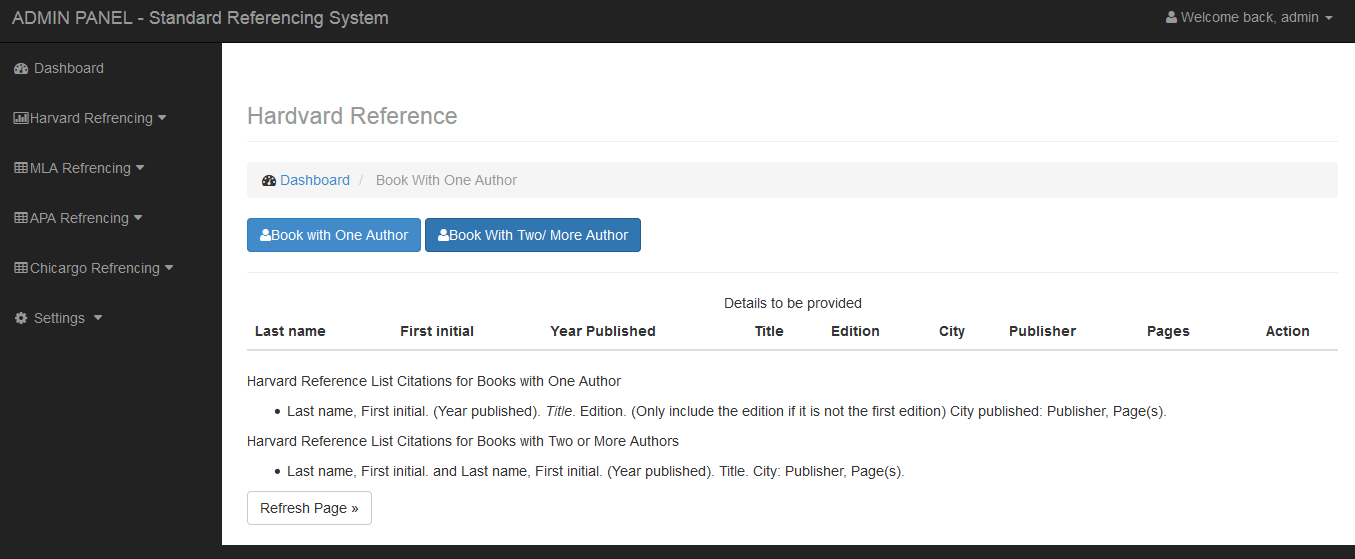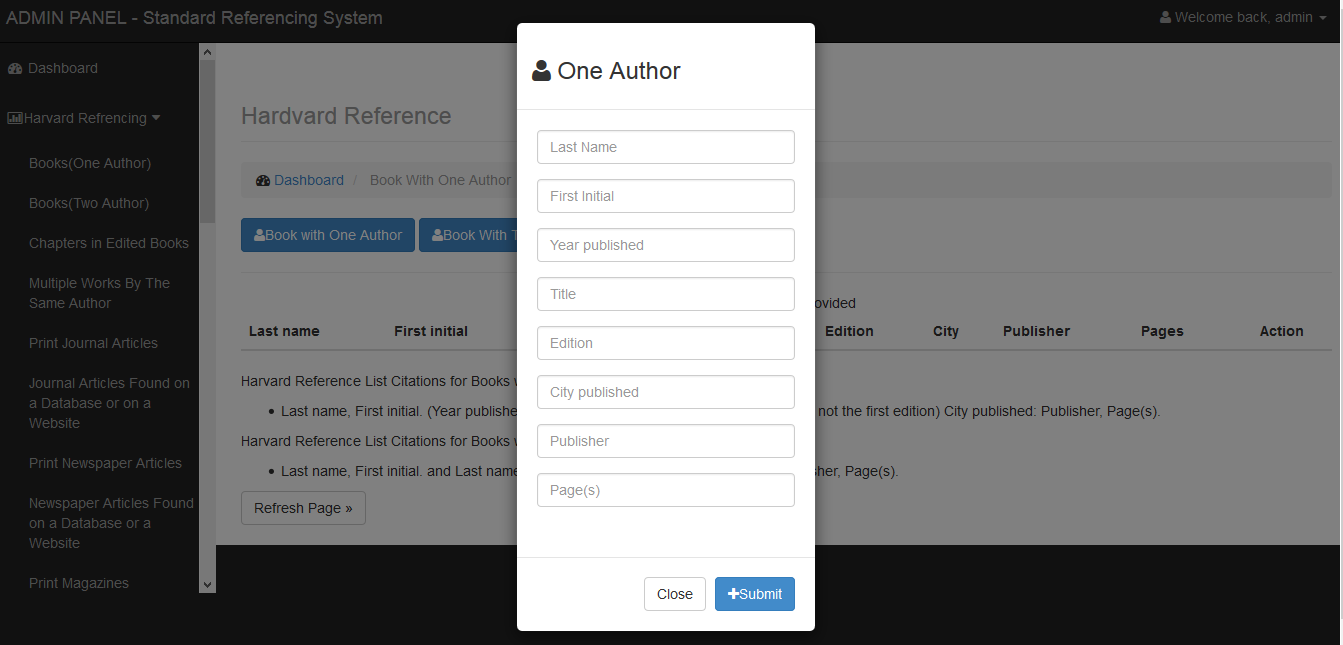Advertisements
Design and Implementation of a Computerised Reference Management System
Content Structure of Design and Implementation of a Computerised Reference Management System
The abstract contains the research problem, the objectives, methodology, results, and recommendations
- Chapter one of this thesis or project materials contains the background to the study, the research problem, the research questions, research objectives, research hypotheses, significance of the study, the scope of the study, organization of the study, and the operational definition of terms.
- Chapter two contains relevant literature on the issue under investigation. The chapter is divided into five parts which are the conceptual review, theoretical review, empirical review, conceptual framework, and gaps in research
- Chapter three contains the research design, study area, population, sample size and sampling technique, validity, reliability, source of data, operationalization of variables, research models, and data analysis method
- Chapter four contains the data analysis and the discussion of the findings
- Chapter five contains the summary of findings, conclusions, recommendations, contributions to knowledge, and recommendations for further studies.
- References: The references are in APA
- Questionnaire.
Abstract Of Design and Implementation of a Computerised Reference Management System
mines the design and implementation of a computerized reference management system. The research project was carried out to solve the referencing/plagiarism problem students undertaking their research projects in universities, polytechnics and colleges of education face. The research project covered four (4) major referencing styles namely; MLA, APA, HARVARD and CHICAGO.
The researcher aimed at building a user friendly system where students can easily enter information sources for accurate, fast citations using the appropriate referencing style approved by their institutions. The implementation of the system was achieved using PHP and MYSQL programming languages.
Advertisements
CHAPTER ONE
INTRODUCTION
Referencing simply refers to the process of citing or documenting the sources of quotes, theories, ideas, illustrations and diagrams used in writing a university research paper, essay, article, assignments etc (Archibong, 2014). Referencing is an important task in the research writing process, as acknowledgements and other necessary credits need to be given to sources or authors where information is gotten from.
The function of references is to allow the reader to identify the source of an idea or locate a quotation. They should therefore be clear and consistent, and poor presentation may be penalized.
References should be numbered in the text and written out in full at the bottom of the page as footnotes (Chernin, 1988).
You should reference every piece of evidence you use and should also reference key ideas and approaches drawn from the secondary literature.
Footnotes are not included in the word count, but you must not include any material other than references to secondary or primary sources. Any written material should go in the main body of the essay or dissertation. You should also always reference the book/article/source/lecturein which YOU discovered the information. Copying out someone else’s footnotes is plagiarism (Laurens, 2009).
Reference management software, citation management software or personal bibliographic management software is software for scholars and authors to use for recording and utilising bibliographic citations (Enrico,2013). Once a citation has been recorded, it can be used time and again in generating bibliographies, such as lists of references in scholarly books, articles and essays. The development of reference management packages has been driven by the rapid expansion of scientific literature.
These software packages normally consist of a database in which full bibliographic references can be entered, plus a system for generating selective lists of articles in the different formats required by publishers and scholarly journals. Modern reference management packages can usually be integrated with word processors so that a reference list in the appropriate format is produced automatically as an article is written, reducing the risk that a cited source is not included in the reference list. They will also have a facility for importing the details of publications from bibliographic databases.
1.2 STATEMENT OF THE PROBLEM
In recent years, the issue of plagiarism has been a dominant concern for students especially in higher institutions of learning (Neville, 2007). Some students in Nigerian Universities, Polytechnics and Colleges of education find it difficult to properly reference a source of information with appropriate referencing styles approved by their institutions. However, there can be a fine line between plagiarism and poor referencing practice, and learner development and support units in further and higher education institutions report that students often struggle to understand, not just the ‘how-to’, but the ‘when to’ and ‘why’ aspects of referencing.
Referencing sources in academic writing is such an integral part of academic writing that academic practitioners do not always give it the central attention it deserves. According to Angélil-Carter (2000), some students see referencing or citations as a formality, hence they do not take it seriously.
1.3 OBJECTIVES OF THE STUDY
The main objective of the study is to design and implement a computerized reference management system. Specific objectives of the study are:
- To design a system that will take up citation projects and store information sources in a secured manner.
- To design a system that will enable users to reference quickly and accurately with Modern Language Association (MLA) format.
- To design a system that will enable users to reference quickly and accurately reference with American Psychological Association (APA) format.
- To design a system that will enable users to reference quickly and accurately using the Harvard referencing style.
- To design a system that will enable users to reference quickly and accurately using the Chicago referencing style.
SCREEN SHOTS OF THE APPLICATION
1.4 SIGNIFICANCE OF THE STUDY
The study will aid students in properly referencing or citing information when writing any academic paper.
the study will contribute to the body of knowledge as it is relatively new. Student researchers, who find the topic interesting, will use the paper as a guide in developing other referencing systems.
1.5 SCOPE OF THE STUDY
The study is limited to the design and implementation of a computerized reference management system, using PHP and MYSQL programming languages. The implementation will cover four (4) major referencing/citation styles namely: MLA, APA, CHICAGO and HARVARD.
1.6 LIMITATION OF THE STUDY
Financial and time constraints were the major limitations to the study. Financial obligations to get necessary software for the design aspect of the project were a bit challenging.
Combining the research project with lectures was also stressful on the researcher.
1.7 DEFINITION OF TERMS
Reference: is a relation between objects in which one object designates, or acts as a means by which to connect to or link to, another object.
Reference Management System: Reference management software, citation management software or personal bibliographic management software is software for scholars and authors to use for recording and utilising bibliographic citations (references).
MLA: Modern Language Association
APA: American Psychological Association
System: a set of things working together as parts of a mechanism or an interconnecting network; a complex whole.
Academic Paper: A research paper usually written at tertiary institution.
REFERENCES
Angélil-Carter, S. (2000). Stolen Language? Plagiarism in writing. Harlow: Pearson education.
Archibon, A.A (2014). Ref 101: The Nitty-Gritty Of Referencing In Research. Retrieved from https://nairaproject.com/blog/complete-guide-on-how-to-reference-in-research.html
Chernin, E. (1988). “The ‘Harvard system’: a mystery dispelled”, British Medical Journal. October 22, 1988, pp. 1062–1063.
Enrico, F (2013). “Usage of Reference Management Software at the University of Torino”. JLIS.it. University of Florence. 4 (1). doi:10.4403/jlis.it-8679. Retrieved 29 June 2013
Laurens, M.E. (2009). Maturation, fecundation, and segmentation of Limax campestris, Binney”, Bulletin of the Museum of Comparative Zoology at Harvard College, Volume 6, p. 194.
Neville, C. (2007). The Complete Guide to Referencing and Avoiding Plagiarism. Maidenhead: Open University Press.
Advertisements





